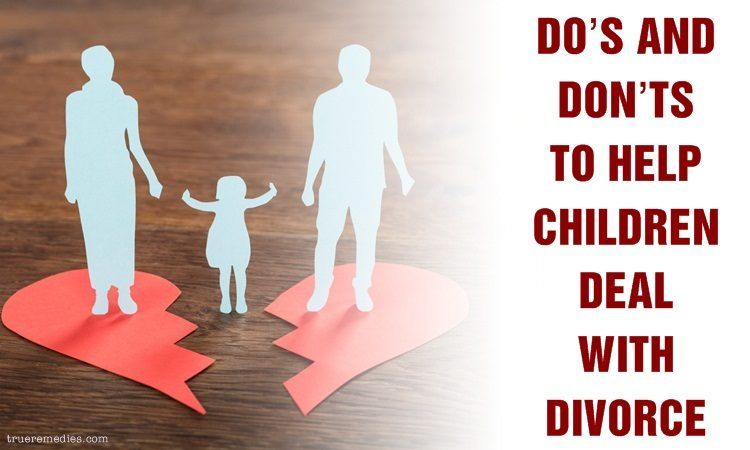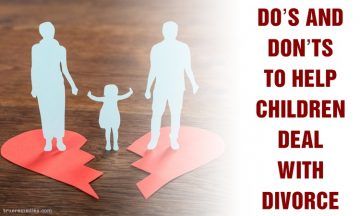Table Of Contents
When we decide to get married to someone, we always hope that we will live together happily forever. However, we cannot see the future that one day, we will break up. It is such a hard time, especially if you have kids. Children may wonder why their parents do not live together anymore like their friends’ parents or what their life will be without living with only father/mother. Many studies concluded that for children whose divorced parents would have lower future competence in all areas of life such[1], especially their emotions when they would be likely to be stressed, resulting in increased delinquent and aggressive behaviour[2]. Therefore, what should you do with your kids to reduce the pain they have to suffer as much as possible? In our article today on TrueRemedies, we will give you a list of the do’s and don’ts to help children deal with divorce. Please read it carefully!
- Top 13 Warning Signs Of Childhood Depression And Anxiety
- Top 9 Science-Backed Secrets To Be A Happier Mom At Home (This article was medically reviewed/fact checked by Dr. Robi Ludwig)
The Do’s And Don’ts To Help Children Deal With Parental Separation
I. What To Do?
1. Talk With Your Kids
Choose a suitable time to talk with your children about your decision and answer all their questions about this problem such as they will live with whom, they need to live in a new house or not, they will study in a new school or not, etc. It is essential to make clear that the child does not need to be responsible for this problem and divorce happens not because of the child. You should tell the children that nothing can change you your love for them: both of you always love them and will take care of them as in the past, this will help them feel more secure.
Besides, spend time asking them about their feelings and activities around them as well as at school. You should tell them that they can share anything with you and you are always present to help them when they have problems. It is normal when the change in family structure may cause some negative feelings such as anger, disappointment, sadness, etc. You should respect these feelings and help them overcome by listening to their sharing instead of shouting or denying their emotions.
2. Spend Time On Kids
Make sure that your child meets your ex-spouse regularly, especially on special events such as birthdays, graduation, etc. You can take your child to his/her mother/father’s house weekly or monthly. Regular visitation not only is the responsibility of your ex-spouse but also helps the child to feel loved even though his/her parents do not live together anymore. Studies showed that children who frequently contacted parents after divorce would keep their academic performance and have higher self-esteem[3].
3. Maintain A Good Relationship With Your Ex-Spouse
It is essential to maintain a friendly relationship with the other parent, and even if you do not like him/her. You should put your child as a priority, and he/she needs both father and mother. What will happen if you do not allow your child to meet your ex-spouse or what will happen if you and your ex-spouse always have postdivorce conflict? The most vulnerable one is your child.
4. Ask For Help
Bear in mind that you are not alone. You have family and friends who are always willing to help you when you are in trouble. If you find it difficult to stabilize your child’s feelings, you can ask for their and advice from psychologists. Moreover, there are some schools or community organizations providing support groups for children of divorced parents which can help you.
TrueRemedies Partner Solutions

Need a Help from the Leading Expert Online, Available 24/7?
They’re all here and ready to answer your questions online or by phone. Keep asking questions until you get the answer you need.
II. What Not To Do?
1. Divorce Is Your Fault
Divorce is often both two sides’ fault along with many reasons around. Therefore, if you get all the responsibility and tell your child that you are the faulty person, the child will think it is true and blame you for misfortunes that they have to suffer.
2. Divorce Is Children’s Fault
The broken family may make children become stressed because their family structure is changed. The worst thing kids think right now is that their parents break up because of them[4]. They may think that they did not meet their parents' expectations, they were naughty, or they did not listen to their parents, so their parents were bored, resulting in divorce. Sadly, many parents support this thought. You should not do that. Instead, you need to try to explain to your kids that they are not blamed for this divorce. Besides, remember to express your love with them.
3. Say Bad Things About Your Ex Husband/Wife
Divorce hurts all members of the family. Children, of course, do not want anyone to bad-mouth their parents. We know you may be angry with your ex-spouse, but do not say bad words about him/her, especially in front of your kids because this action may cause long-term consequences for children. You want your children to be by your sides, but kids may tend to avoid talking with father/mother (who said bad words about another)[5]. Moreover, postdivorce conflict may lead to a higher risk of depression and anxiety in children[6] because they feel like in the middle of their parents’ conflict.
4. Prohibit Your Children From Contacting Their Father/Mother
Even if you hate your ex-spouse, you should not hurt your children by preventing them from meeting their father/mother or not allowing ex-wife/husband to attend important events such as birthdays, graduation ceremonies, etc. You do not need your ex-spouse, but your children need their parents!
5. Your Child Becomes An Intermediary
Even if you do not want to communicate with your ex-spouse, do not take your child as a messenger. Try to talk to the other person on your own, instead of asking your child to deliver the words. However, he or she cannot convey your words or thoughts and vice versa. He/she may feel stuck in his/her parents’ relationship.
Furthermore, do not use your child to get information about your ex-spouse. Many divorced people always ask their children after each visit to their ex-spouse. Although you are curious, you should remember that his/ her life after divorce is no longer related to you. Interrogating your child accidentally turns the child into a spy, following his/her parents' movements to notify the other person. This action also causes a higher level of anxiety and depression on children[6]. You can ask some questions related to your child such as “Where did your daddy/mommy and you go?”, “What did you do?”, “Are you happy?”, etc.
In conclusion, divorce is an unexpected problem in our life. The children are the most affected ones if divorce happens. Your responsibility is to reduce the consequences of divorce on your children’s physical and mental health condition. We hope that our topic today gives you helpful and interesting information on the do’s and don’ts help children deal with divorce.
All content provided is for informational and educational purposes, so we recommend you consult a psychologist specialized in raising children to ask for advice about any problems. If you have any comments or questions, please leave them in the comment box.









